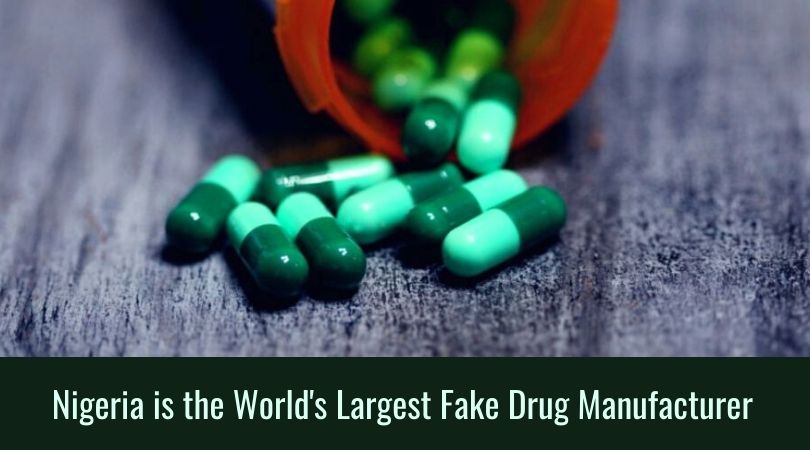
Nigeria is one of the leading pharmaceutical manufacturers in the world. About 24 billion dollars of medicines are produced annually in the country: more than twenty thousand finished medicines and about four hundred substances. The same country is the largest producer of fake drugs. The annual sales of counterfeit medicines is 15–20% of the total Nigerian pharmaceutical business. Recently, law enforcement agencies have noted a high level demonstrated when counterfeiting drugs: fraudsters have sophisticated technical means.
To discuss the magnitude of the problem and the possibilities for solving it, the heads of pharmaceutical companies in Nigeria recently gathered in Abuja. The meeting was attended by A & J Pharmaceutical Nig. Ltd, Abumec Pharmaceuticals Ltd, Ceenek Pharmaceutical Limited, Dana Drugs Limited, Juhel Nigeria Limited, Neimeth International Pharmaceuticals Plc, and other drug manufacturers. They expressed their views on the doctors, pharmaceutical manufacturers, law enforcement officials.
Dangerous fake
The problem of fakes is faced by most major manufacturers. Counterfeit products not only damage the enterprise or the market but also create a threat to human life. According to the president of Dana Drugs Limited, “when it comes to medicines, we are not only talking about economic losses for the manufacturer but also about the negative impact on human health, in particular, that the expected recovery does not occur. Therefore, it is absolutely imperative for regulators, pharmaceutical companies, entrepreneurs, and consumers to do everything possible to ensure that only genuine, high-quality drugs are delivered to patients. ”
The director of Nisa Premier Hospital in Abuja noted that despite the progress made in medicine over the past 50 years, as well as the considerable efforts of physicians, “in many cases, patients cannot be saved.” This, in his opinion, is partly due to fake drugs. Based on his experience, he claims that fakes account for about 10% of the industry’s turnover. Traditionally, antibiotics, antiprotozoals, antimalarial drugs, hormones and steroids have been falsified on a large scale, and, as part of current trends, drugs such as dietetic drugs, drugs for diabetes, hypertension and cancer are added to this list.
Sometimes the use of fake drugs leads to irreparable consequences. In 1995, 2,500 people with meningitis died as a result of using fake drugs in Nigeria.
Find and punish
The president of A & J Pharmaceutical Nig. Ltd believes that the reason for the widespread distribution of fake and low-quality drugs is the slow progress of trials and the imperfection of the legal system. “Mild punishments, ease of issuance of guarantees and inadequate infrastructure, when there are only one inspector for 172 drug retailers, while it is recommended that there are one inspector per 100 merchants,” led to the problem reaching its current magnitude.
To cope with the threat, he calls on government to “enact a law for manufacturers of fake drugs.” He also insists on the strict application of the “Act on Medicines and Cosmetics” throughout the country, guided by the “true meaning of this law” and ensuring the use of high-quality manufacturing, clinical and pharmaceutical methods. “Product analogs should be banned and doctors should not be bothered when suspicions arise. The police should set up mobile teams in areas where they sell fakes, and treat the production of counterfeit medicines as well as the production of drugs. ”
Counterfeit Nigerian medicines are successfully fought outside of Nigeria. In May 2002, a grand jury in New York named five companies that were charged with manufacturing fake Viagra and selling it online. The investigation covered a 17-month period during which investigators purchased 28,000 fake Viagra pills from Nigeria.
Price of health
The Director of Ceenek Pharmaceutical Limited spoke in detail about the effects of counterfeit drugs on the industry and doctors. According to him, the fake drug market makes up 15–20% of the entire drug market. Unfortunately, he noted, government testing laboratories are not yet able to help solve this problem.
According to him, not only tablets and capsules are now faked but also expensive and complex injections and inhalations. “The therapeutic segment of the fake market has also expanded,” he said. In his opinion, a moderate estimate of the world market for counterfeit medicines is $20 billion, which is approximately 10% of the total global turnover of pharmaceutical products, and this is one of the fastest growing black markets in the world after prostitution, drugs, terrorism and the arms trade.
In July 2002, the Italian authorities arrested two tons of raw materials for the production of counterfeit medicines, smuggled goods from Nigeria and China, packed in Europe and sold in the Americas. “Between 5 and 8% of drugs that are shipped in bulk in the United States are fake, unauthorized, or substandard.” Moreover, the quality of falsified packaging is amazing. There were several cases when the companies themselves were not able to distinguish fake from their own products by labeling and packaging.
Reputation is important
The representative of Juhel Nigeria Limited believes that the image of goods manufactured in Nigeria has been seriously affected by the export of substandard drugs. “Nigeria and China have the dubious honorary title of the world’s largest manufacturers and exporters of fake drugs.”
As Nigeria has gained a reputation as the largest source of counterfeit medicines, trust in all Nigerian companies is at stake. Due to the low prices of counterfeit medicines, honest companies operating in accordance with ethical principles are not competitive. The largest Nigerian drug manufacturers called for closer cooperation between law enforcement and legislative authorities with the pharmaceutical industry, expert training for government officials and tougher penalties.
